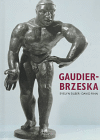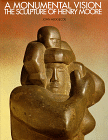
|

|

|

|
|
|
B
|

|
BASKIN
|
Sculpture of Leonard Baskin |

|
|
| |
by Irma Jaffe |
| A comprehensive study of Baskin’s masterworks in bronze & wood,
although he is better known as a printmaker & book illustrator. He uses the
human figure as the main motif for his sculpture. Jaffe analyzes Baskin’s
background & his work. Over 150 photographs.
|
| |
BELSKY
|
| Sculpture |
|
|
| |
by Franta Belsky |
| |
| |
BLENSDORF
|
| Ernst Blensdorf - Sculptor |
|
|
| |
by K.B. Manning |
| |
| |
BRANCUSI
|
| |
As a boy Brancusi was a cabinet maker and he
made his own violin when only sixteen years of age. He made most of
his own furniture & forged his own chisels & gouges. His carving
method {like those of Hepworth, Moore & Arp} was always direct cutting
without preliminary drawings. Brancusi was indebted to Rodin who employed
him briefly as an assistant. You can see his grace & precision in his
sculptures. A single work might remain unfinished for a number of years.
He always retained a love for tactile involvement with stone & wood. His
sculptures are enhanced by the gleaming surface of the bronze. Photography
for Brancusi was another form of invaluable tool with which to explore &
re-examine the sculptural form & it’s effects. For more information I would
recommend any of the following books on Brancusi.
|
| |
| Brancusi Photographs |
 |

|
| |
by Elizabeth Brown |
| |
| |
Brancusi: A Study of the Sculpture |

|
|
| |
by Sidney Geist |
| |
| |
| Brancusi |
|
|
| |
by David Lewis |
| |
| |
D
|

|
DEGAS
|
| |
Degas began sculpting in his early 30s. It became an obsession with him &
it also helped to enhance his two-dimensional works. He did not exhibit any
sculpture before 1866. His style was nearer to Rodin’s & there is little
distinction to be made at this time. He especially liked modelling in wax,
it allowed him to continually rework the pieces & being wax it had the
translucency of flesh. He was passionately interested in photography.
A shy, awkward man, he was renowned for his aloof manner & sharp-tongued
wit. He grew even more anti-social & withdrew into his studio where he
worked obsessively. He died a lonely man of 83.
Recommended sources:
|
| |
| The Private Degas |
|
|
| |
by Richard Thompson |
| The book covers Degas’ career & the wide variety of media
he used, oil, pastels, monotype, photography & sculpture. It examines
the full gamut of Degas’ subjects - ballet, portraits, nudes, horses &
genre scenes.
|
| |
| Impressionism |
 |
|
| |
by Michael Howard |
| For information on Degas' sculpture. |
| |
| Studies In Impressionism |

|

|
| |
by John Rewald |
| For information on Degas' sculpture. |
| |
DOBSON
|
| Sculpture Of Frank Dobson |

|

|
| |
by Neville Jason |
| |
| |
E
|

|
EPSTEIN
|
Epstein: Artist Against the Establishment |

|
|
| |
by Stephen Gardiner |
| |
| |
| Epstein: Sculpture & Drawings |
|

|
| |
by Evelyn Silber et al |
| |
| |
| The Sculpture Of Epstein |

|

|
| |
by Evelyn Silber |
| Although Epstein was born in New York, he was the
most important British sculptor of the early twentieth century.
He was the modern pioneer of direct carving. The book is a major critical
study and well documented catalogue of Epstein’s sculptures. 586 illustrations.
|
| |
F
|

|
FRINK
|
| Elizabeth Frink A Portrait |

|

|
| |
by Edward Lucie-Smith |
| British sculptor who was renowned for her haunting
representation of birds, animals and men, especially Goggle
Heads. In the above book she talks candidly about her life and work.
Contains 100 superb photographs.
|
| |
G
|

|
GAUDIER-BRZESKA
|
|
Gaudier-Brzeska
|

|

|

|
by Evelyn Silber, David Finn
|
| Like ,
Gaudier-Brzeska carved direct. Although tragically killed in
1915 aged only twenty-three, his output was staggering. He
became associated with the Vorticists and wrote articles for
the magazine Blast. His bold use of semi-abstract sculptural
forms was in advance of his time. The book provides a uniquely
valuable reference source of information about Modernism and
contemporary art. With 295 illustrations.
|

|

|
|
| Gaudier-Brzeska - Artist & Myth |
|

|
| |
by Roger Cole |
| |
| |
| Savage Messiah, A Biography of the Sculptor Henri Gaudier-Brzeska |

|

|
| |
by H.S. Ede |
| Savage Messiah tells the story of Gaudier’s
meeting with Sophie Brzeska in Paris, their move to London,
& life together until his death in 1915. The source is Sophie’s diaries
& letters from Gaudier-Brzeska.
|
| |
| A Memoir of Gaudier-Brzeska |

|

|
| |
by Ezra Pound |
| In 1912 Gaudier-Brzeska met Wyndham Lewis &
through him he came in contact with Ezra Pound & Jacob Epstein.
Through Nina Hamnett he met Roger Fry. In 1914 Gaudier-Brzeska contributed
to the first London Group exhibition. Ezra Pound bought the sculptor the
stone from which the famous ‘Hieratic Head’ of the poet was made. This is a
moving tribute with exquisite line drawings by Gaudier-Brzeska &
B/W photographs of his sculptures.
|
| |
GIACOMETTI
|
| |
One needs to see & walk around any sculpture.
Alas most galleries usually do not allow this. Sculptures are
usually shown in a poorly lit corner or enclosed in a perspex case, which is
about as exciting as viewing paintings down a coal mine! The ability to
manoeuvre around Giacometti’s work is even greater because in the transition from
front view to profile view the sculptural shape changes from 2D to 3D.
David Sylvester explains it more eloquently in his book{see below}.
Giacometti scaled his sculptures down to such an extent that he was able to
carry three years of work in six matchboxes!
Sources:
|
| |
| Giacometti |

|
|
| |
by Fletcher |
| |
| |
| Giacometti |
 |
|
| |
by Charles Juliet |
| |
| |
|
Giacometti - A Biography
|

|

|
|
|
| Giacometti {Genet Interview} |
|
|
| |
Tate Gallery |
| |
| |
|
Looking At Giacometti
|

|

|

|
by David Sylvester
|
|
Rapidly running out of grandmothers to sell for one
of Sylvester's books, this will be the third !
|

|

|
|
| The Phenomenology Of Perception |

|

|
| |
by Merleau-Ponty |
| This book was invaluable to Giacometti |
| |
| Giacometti |

|
|
| |
by B.Lamarche-Vadel |
| He was best known for his elongated, skeletal figures.
The book studies the way in which Giacometti grapples with
Cubism in the 20s and his developing conflict between abstract forms and the
representation of the human body. In 1935 he broke from the Surrealists and
concentrated on perception and concept of distance by making heads and
figures seem smaller from an optical distance. Generously illustrated
with drawings, paintings & sculptures.
|
| |
H
|

|
HEPWORTH
|
|
Barbara Hepworth
|

|

|
|
|
|
Barbara Hepworth
|

|

|
| |
by A.M. Hammacher |
| |
| |
| Barbara Hepworth - A Life Of Forms |

|
|
| |
by Sally Festing |
| |
| |
| Barbara Hepworth - A Memoir |

|

|
| |
by Margaret Gardiner |
| |
| |
| Barbara Hepworth A Retrospective |

|
|
| |
by Penelope Curtis, Alan G. Wilkinson |
| British sculptor whose career spanned six decades
from 1925-1975. Her sculpture moved from figuration to geometric
style. It is associated with the landscape in St. Ives, Cornwall in England.
The book focuses on Hepworth’s unique carvings. Numerous illustrations.
|
| |
| Complete Sculpture Of Barbara Hepworth |
|
|
| |
Published by Lund Humphries |
| |
| |
| A Pictorial Autobiography |

|

|
| |
by Barbara Hepworth |
| |
| |
HICKS
|
| Nicola Hicks Sculpture & Drawing |

|

|
| |
|
| British sculptor essentially a figurative artist, but the book covers both the sculptures and drawings of animals,
and figures of the imagination. Ninety-five pages of descriptive text of ideas and form with photographs. |
| |
L
|

|
LIPCHITZ
|
| My Life In Sculpture |

|
|
| |
by Jacquez Lipchitz |
| |
| |
M
|

|
MCWILLIAM
|
| F.E. McWilliam Sculpture 1932-1989 |

|
|
| |
by Mel Gooding |
| |
| |
| F.E. McWilliam |

|
|
| |
|
| |
| |
MIRO
|
| Miro Sculptures |
|
|
| |
National Gallery Scotland |
| |
| |
MOORE
|
| Henry Moore - Royal Academy |

|
|
| |
by Susan Compton |
| |
| |
| Henry Moore - Complete Sculpture 1955-64 Vol 3 |

|

|
| |
by Alan Bowness |
| |
| |
| Henry Moore |

|
|
| |
by Jianou |
| |
| |
| Henry Moore - An Illustrated Biography |
|
|
| |
by Levine & Packer |
| |
| |
| Henry Moore |
|
|
| |
by Robert Melville |
| |
| |
| Henry Moore On Sculpture |

|

|
| |
by Henry Moore |
| |
| |
| Henry Moore - Wood Sculpture |

|
|
| |
by Henry Moore |
| |
| |
| Henry Moore - My Ideas Inspiration & Life |
|
|
| |
by Henry Moore |
| |
| |
|
Henry Moore - A Monumental Vision
|

|
|
|
|
| Wood Sculpture |

|
|
| |
by Henry Moore |
| |
| |
| Henry Moore |
|
|
| |
by Herbert Read |
| |
| |
| Henry Moore In America |

|
|
| |
by Henry J. Seldis |
| |
| |
| Life Of Henry Moore |

|
|
| |
by Roger Berthoud |
| A very substantial authorized biography {465 pages}. Henry Moore was always controversial in his work but the book
succeeds in humanizing Moore and gives an insight into his life. He praises Epstein and he reveals he had a little
flirtation with Barbara Hepworth when they were at art school together, but later on he dismissed her work as "knitting".
Ironically when someone asked Francis Bacon’s opinion on Moore’s shelter drawings he maliciously quipped "they
looked like knitting with the needles pulled out".
|
| |
| |
| |
|
Click on a
 to read details about buying the associated title from . to read details about buying the associated title from .
|
Click on a
 to read details about buying the associated title from to read details about buying the associated title from
|
|

|

|
| |
|
|
| |
|
|
| |
|||||
|
|

Updated 27th October 2001
|
|











